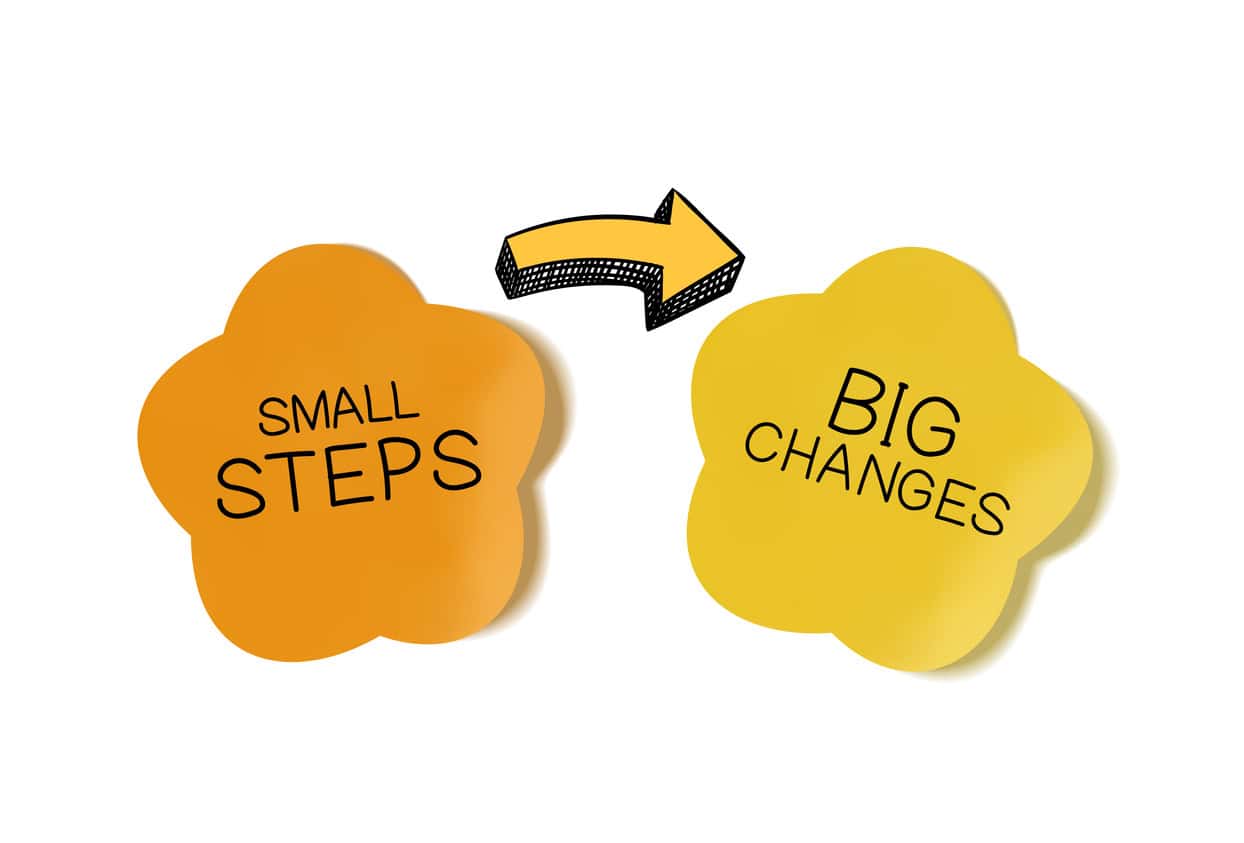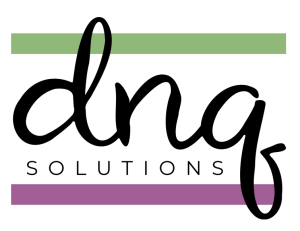
I am updating this post for a second time because the information seems to be particularly pertinent now. I first published it in 2011 and updated it in 2021. In our post-covid world many of us want to make changes both personal and professional and we want them now. We spent several years spinning our wheels staying at home suspended in limbo. Now we have a new normal, we are ready for action, but we sometimes forget that to make sustainable growth and change we must take it slowly. Incremental changes are the ones which last. When we take small steps toward the change we want to make, we make lasting change, and we make it more easily.
KaiZen: small steps toward lasting change
I was first introduced to this concept on April 4, 2011. I took a class offered by the Institute for Challenging Disorganization® titled Kaizen – The Next Step for the Chronically Disorganized Client. It was a fascinating class. Kaizen is a word which comes from two Japanese roots, kai which means change and Zen which means good. During this class I learned that when a person is taught how to make small changes toward a stated goal there is a better chance of success.
How does it work?
Do you wonder why that is true? Let’s think about this. I am going to use the example of a lifestyle change. Let’s say that someone wants to get in better shape. They decide they want to lose some weight and become more physically fit. They have been eating too much fast food and have never been accustomed to regular exercise. The reason that they decided to make this change is that they want to be in better shape for their high school reunion.
The first method they try is a crash diet. This makes them hungry, cranky, and generally out of sorts. They also decide to exercise at a local gym every day. After one week of trying this method they abandoned the crash diet – good thing since that is not a healthy approach and they stopped exercising after day three because their muscles were so sore.
If I applied the Kaizen philosophy to this situation it would look something like this: they would search online for an app to help them lose weight in a healthier way. Weight Watchers and Noom are the two that I am familiar with but I’m sure there are many others. If they use the app consistently, they will plan their meals, eat more healthily, and the weight would come off slowly and steadily. Then, they would also plan to work out with a trainer a few times a week. This they can also do from home or by going to a gym.
The trainer would teach them some exercises which would make them stronger and tone their muscles. The trainer would also encourage them to incorporate other daily exercise into her routine. Things like walking, biking, or swimming. The lesson here is that small incremental changes which are not too tough bring results and are easier to maintain.
Break projects down into small steps
During the ICD® conference in 2021, Juliet Landau-Pope spoke about dyspraxia. We learned that organizing or doing tasks for long periods of time is truly taxing for someone with dyspraxia. That it’s better to tackle projects in small steps and for short amounts of time. She recommends working on a project for about 10 to 15 minutes. This means that to complete a project, you need to break it down into small steps. Then do one step at a time until the project is finished.
This concept of Kaizen, making small steps toward a stated goal is a fascinating one to me. So often we look at the big picture and want an instant result. Kaizen teaches you to slow down. To learn and incorporate the lesson of each step into that which you are working towards.
It takes time and energy to change a behavior or a habit. If you rush through a step to get the next step completed there is a chance that you won’t have adequately learned the previous step.
Know your reason
It’s important to know why you want to change. Changing something just because you feel like it may not stick. Staying on a diet and working out regularly to look good for a high school reunion is all well and good. The reality is that the high school reunion is just an event. It will come and go. If you want to stay on a diet and exercise regularly to be healthier so you can live a better life is a reason that will stick with you.
In conclusion
It may feel like taking small steps is a waste of time but really these small steps are vitally important. We learn better when we process information in small bites. We accomplish more when we do things a little bit at a time because we are focusing our attention on that small task. Little by little the small tasks add up and, viola! A large task is completed. I’m sure you remember the fable of the tortoise and the hare. The moral of that story is slow and steady wins the race. Win the race by taking small steps toward the change you want to make in your life.
Reach out to me if you would like to know more about how taking small steps will help you.
updated; July 16, 2023
Diane N. Quintana is an ICD Master Trainer, Certified Professional Organizer in Chronic Disorganization, Certified Professional Organizer, owner of DNQ Solutions, LLC and co-owner of Release Repurpose Reorganize LLC based in Atlanta, Georgia. She specializes in residential and home-office organizing and in working with people challenged by ADHD, Hoarding and chronic disorganization.


I couldn’t agree with you more, Diane. There’s a reason why they call them “baby steps” — it’s how tiny humans learn to walk, and then run. From diet and exercise to learning a language to almost any big project or change, huge modifications are exhausting. When I took French in school, it felt overwhelming; I have been studying Italian online for several years, and the small-but-consistent approach to daily lessons has allowed me to really take to language learning.
I am fascinated by the Kaizen approach to working with clients with dyspraxia. Given that it affects movement and coordination, it must be unnerving to try to cope with too much change at once. What a great area to serve as an example for your thesis!
Those first few small steps are often the kick in the pants we need to inch-by-inch move ourselves forward towards our goals.
Lately, I’ve been taking 10-15 minutes when I have a pocket of time to go through the closet and bookshelves in my office with the goal of a long-overdue room re-do. As a working parent, I don’t have all day to attend to this project. As much as I’d love to wave a magic wand and have a brand new functional home office, I know it’s a process made up of hundreds of small steps. I’ll just keep reminding myself of Kaizen!
I love the idea of small change. I do think small changes are much easier to sustain than big ones. Exercising for 5 minutes a day feels much more approachable than for an hour and a half, right? The funny thing is, once we strengthen our muscle for the 5 minutes, we often can extend it by a minute or two with little effort, and suddenly, there we are working out for an hour! But even if we don’t, the accumulation of small efforts, put forth consistently over time, is enormous.
Just today I switched things up with a business client of mine. We had been meeting for 3 hour time blocks, but I was finding that it felt burdensome to him. We had established tools, but he wasn’t using them. So, today are trying a new model… a virtual morning “check in” to review his calendar, agenda, and plan for the day. He was able to tell me at the end of the 1/2 hour that it didn’t feel burdensome or onerous at all. I think that is ‘win’ because it won’t be something he dreads when we meet again. I’m hoping to do this every day for 2 weeks, then reassess and see how often we need to meet going forward.
I totally agree, Diane. Small steps to a better life are key, no matter how small. Lifestyle changes are better when you do them in increments changing one at a time, and eventually, you will have transformed your life.
I’m with you 100% about the power of small changes. Not only is there less barrier to entry, but as you said, they more often produce lasting results. I’m a big Noom fan. I’ve engaged in the program for several years and it’s been helpful with achieving my goals around healthy living. My husband and several friends have also used it successfully.
I learned about kaizen from Kathy England’s ICD class. I think that’s the one you referred to. My takeaway about the concept, which developed in a business context, is about continuous improvement. Those changes or ‘improvements’ happen in the form of small, non-judgmental ongoing changes. The goal is to improve a process and eliminate waste. The philosophy is applicable to our personal lives and goals too.